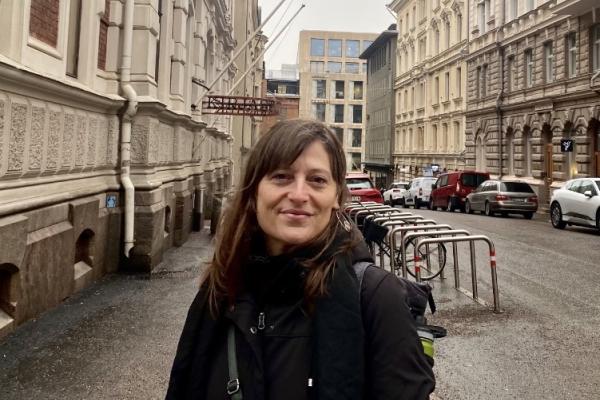October 2024 FLAS Alumni Profile: Ona Renner-Fahey

Ona Renner-Fahey, PhD in Slavic and East European Languages and Literatures, Class of 2002
Academic Year 1999-2000 FLAS Fellowship Recipient for Russian (Dissertation Writing)
Where do you work and what is your current position?
I have been a faculty member at the University of Montana, in the Department of World Languages and Cultures, for over 20 years. I teach Russian language, literature, and culture and consider myself extremely lucky to have landed in beautiful Big Sky Country those many years ago! For the last two years I have also served as Editor for Book Reviews for the Slavic and East European Journal, which happens to be currently housed at Ohio State.
What was your focus or research interest when you studied at OSU?
When I first joined the Slavic Department at Ohio State, I had recently taken a summer graduate course at Middlebury College dedicated to Marina Tsvetaeva, in which we’d read Anna Saakiants’ hefty biography of the poet in Russian, as well as a volume of Tsvetaeva’s poems (many of which we had to memorize.) I loved the deep dive into one author, but then at Ohio State started reading really widely and found that was eye-opening in other ways. Tsvetaeva’s ideas on poetic inspiration had intrigued me, but then I came to be interested in how other Russian poets mythologized their creative processes. I ended up writing my dissertation on that topic (with, of course, an abundance of critical feedback from my fantastic advisor, [current CSEEES Director] Angela Brintlinger!).
If you are a traveler, what is one of your favorite trips you have taken?
I have been fortunate to travel to many wonderful places—among them Hungary, Poland, Ukraine, Finland, and China. And I've been to Russia maybe a dozen times. It's impossible to choose a favorite place or trip, but one of the most impactful for me personally was when my mother met me in Moscow after my year at Moscow State University (1993-94), and we traveled together to the German-Russian village of Podsosnovo in the Altai Krai to meet some family members for the first time. My grandfather, who had escaped the Soviet Union during WWII after his family had been arrested and exiled for being Germans, had just been reunited with a sister... after over 40 years. My having studied Russian language in college and graduate school provided me with the ability to get to know my great-aunt Emma and her family. They lived in a house they'd built themselves out on the Siberian steppe, with an outhouse, a cow, and a great little dog nicknamed Vasilek-Starichok. This was not the trip where I walked on the Great Wall of China or attended a performance at the Bolshoi Ballet or bathed in the Szechenyi Baths of Budapest, but it was the one where my many years of language study were the most fruitful and I felt grateful for that during the entirety of the trip.
How has your FLAS from CSEEES helped you throughout your post-graduate life?
My husband and I both applied for a FLAS in the same year, in order to study Polish. While he received the FLAS that year and I did not, it meant that we got to take a Polish language class together for a year. The FLAS is what made this possible because he was a student in Ohio State's Moritz College of Law and would not have been able to study Polish without the scholarship. Not only did we have great competitive fun with our grades in that class (!), we also were extremely thankful for the financial support, as we were both in graduate programs full time and had a young child. In other words, his FLAS award benefitted me, as well! Then, the following year I received a FLAS for my continued study of Russian. The FLAS allowed me not only to have dedicated research time toward my dissertation but also helped me carve out the time to continue with my study of Polish, which has remained a life-long interest for me. During my time as a graduate student at Ohio State, I was provided with valuable teaching experience (language, literature, and even vampires!) and then I benefitted enormously from my FLAS, which allowed me to immerse myself in critical research time.
